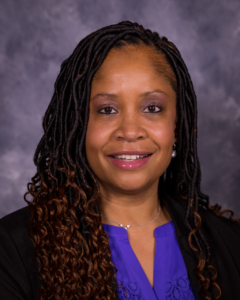Learn & build relationships
 Meet Rana McVay, assistant director of business and industry services (BIS) at Tulsa Technology Center in Tulsa, Oklahoma. McVay is a founding member of ACTE’s Inclusion, Access, Equity and Diversity (IAED) Advisory Group. Her interview appears as part of a spotlight series on advisory group members and educators striving to increase access to high-quality career and technical education (CTE).
Meet Rana McVay, assistant director of business and industry services (BIS) at Tulsa Technology Center in Tulsa, Oklahoma. McVay is a founding member of ACTE’s Inclusion, Access, Equity and Diversity (IAED) Advisory Group. Her interview appears as part of a spotlight series on advisory group members and educators striving to increase access to high-quality career and technical education (CTE).
Please share a little bit about yourself. What inspired your interest in CTE?
I started my first real job in January 1995 as a homeowners’ claims adjuster for a major insurance company. But after two years of climbing roofs and arguing with contractors, I decided to change gears. I followed my heart and applied for a teaching position.
My first teaching role was as a business, marketing and information technology education instructor at U.S. Grant High School in Oklahoma City. I attended my first summer conference (Oklahoma’s annual CTE conference) in August 1997. And I didn’t have a clue what to expect, but that conference changed my life.
While walking around during the lunch hour, a Black gentleman stopped me and said that I should attend a luncheon being hosted by the Oklahoma Association of Minorities in Career & Technology Education (OAMCTE). It was as if the heavens had opened up. I walked into a room full of people who looked like me and who also were in love with CTE.
That interaction jump-started my leadership journey. I served as secretary, scholarship chair, and for two terms as president of OAMCTE. Because of the knowledge gained through this experience, and through my desire to stay on the leadership path, I became president of Oklahoma ACTE (OkACTE) in August 2019. I’m proud to say that I am the first Black person to serve as president for this state organization, which supports more than 4,000 members.
CTE and I fell in love at an early age.
Throughout my career I have worked as a classroom instructor and a CTE program supervisor, and currently, I serve as the assistant director with BIS at Tulsa Technology Center. Twenty-six years later, I’m still searching for opportunities to serve. My passion for CTE and these organizations have launched my career in directions I could not have imagined.
What was your education experience like? What did you study?
I attended Northeastern State University in Tahlequah, Oklahoma, and obtained a bachelor’s degree in business education. I was fortunate to attend college on the President’s Leadership Class academic scholarship, which paid for my tuition, fees, and room and board. Had it not been for that financial assistance, I’m certain I would not have received my degree directly after high school. Then, with consistent encouragement from my current director, Matt Litterell, Ed.D., I went back to school in October of 2019. I received a Master of Arts in educational leadership from Southern Nazarene University located in Bethany, Oklahoma, in June 2021.
What barriers did you face in pursuit of postsecondary education? How did you overcome those obstacles?
One of my barriers was the expectation that I would not attend college. It wasn’t that I didn’t have the academic ability. But I didn’t have the financial means. I grew up in a single-parent household, where I was the first to graduate from high school. I am number three in a family of four girls, and both of my older sisters had children by the time they were 16 years old. Because I was determined to not become a part of that statistic, I became more involved in school activities and developed relationships with like-minded folks to help me stay the course. There were adults who noticed my determination and love for education and invested their time in me. I am where I am today because of them.
One of my mentors is Jocelyn Payne, Ed.D., who I met when she was a vice president at Northeastern State University. And she is responsible for me applying for the President’s Leadership Class scholarship. I consider her as another mother to me. She also coordinated my wedding.
I must say that my mother, Cheryl Adkins, was the most influential person in my life. She taught me how to carry myself and what it meant to be a woman devoted to the success of her children. She had it tough, and she was tough on us. But as an adult, I have the greatest appreciation for the unique and somewhat unorthodox teaching moments that she delivered. She was a preschool teacher for many years and watching her pour into the children of others motivated me to want to pour into the lives of others as well.
Please briefly discuss your role with ACTE’s IAED Advisory Group.
I am one of the original members of this advisory group, and I am proud to say that I have been an active participant in redefining ACTE’s IAED community. There are so many unforeseen challenges to this work. But after deliberation and a host of constructive conversations, we agreed on a path forward to develop the IAED Mentorship Program. This would open a door to building relationships and a better understanding of how ACTE serves underserved and underrepresented populations.
I have volunteered as a mentor for the past two years, and the relationships developed from this work are priceless. Because of that, I’m encouraged to stay the course. I am dedicated to the work associated with IAED, and I am determined to remain engaged.
In your opinion, what are the greatest challenges facing education today? And how can CTE leaders act courageously to develop stronger, more inclusive learning environments for all?
Our greatest challenges are people. People don’t fully respect or appreciate one another and their differences. If people did those things, there would be no need for initiatives and programs that address inclusion, access, equity and diversity. But we can’t stop talking about IAED. We have to continue to be uncomfortable until we can get more comfortable. Sharing and training others on how to build relationship must continue; it’s how we deliver it and how we share it that’s going to have the greatest impact on our society.
What can Techniques readers expect to gain from participating in ACTE’s IAED activities? And why do you think they are important to offer the larger ACTE community at this time?
There’s a huge opportunity to network. If you’re not familiar with the IAED work, that’s okay! Showing up is one of the most important steps. Through these networking opportunities, there is exposure. There is increased awareness, and there is relationship building. You could experience a type of growth that you may not otherwise, just by being present.
ACTE is a national organization with a membership of diverse individuals.
As educators, we’re always seeking best practices to influence students as well as our colleagues. With the support of resources and activities led by ACTE, there are many more conversations to be had — within institutions and our homes — to strengthen IAED relationships across the country and the world.
Is there anything else you’d like to share?
Thank you for allowing me to participate and share my point of view. Education, not just CTE, is my passion. I try to walk in my truth each and every day and I pray that as we continue to learn from one another that we get to know each other as well. I’m an open book who is willing to have a conversation with anyone. If we talk together, we grow together.
Learn more and join the book club
Book club will occur as the culminating event of ACTE’s 2022–23 IAED in CTE webinar series — in April 2023. Those who wish to participate are encouraged to read one or both books listed below. Then consider how the work of Glenn E. Singleton, Ijeoma Oluo, Donald Walker and you can change people and hearts and entire organizations.
Courageous Conversations About Race: A Field Guide for Achieving Equity in Schools
Schools, like all organizations, face a nearly insurmountable hurdle when addressing racial inequities — the inability to talk candidly about race. In this timely text, author Glenn E. Singleton enables you to break the silence and open an authentic dialogue that forges a path to progress for racial equity.
So You Want to Talk About Race
The stakes could not be higher, and the task ahead seems daunting. Ijeoma Oluo guides readers of all races through subjects ranging from police brutality and cultural appropriation to the model minority myth in an attempt to make the seemingly impossible possible: honest conversations about how racism infects every aspect of American life.
Learn more about CTE education leaders working to advance IAED in CTE.



